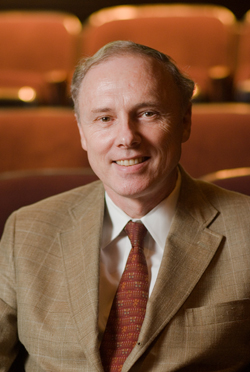Thanking Jim Banks
For the past semester, we've had a pioneer in our midst. Why not stop and say hello?
Thanking Jim Banks
For the past semester, we’ve had a pioneer in our midst. Why not stop and say hello?
We pack so many educational experiences into our daily lives at TC that we don’t always stop to appreciate just how amazing some of them are. It’s especially important to do that when the “experience” is someone special in our midst who represents a philosophical viewpoint, a field of endeavor, or a body of experience or thought. We don’t want to look back and realize only in hindsight that we were in the presence of someone who has changed lives with powerfully humane ideas and actions.An unusual number of people at TC fit that description, but the one I’m thinking of is with us only for this year. I’m thinking of James Banks, our visiting Tisch Lecturer.
Jim is the author of such important works as Diversity and Citizenship Education: Global Perspectives, which examines the tension between a unified political culture and a racially and ethnically diverse society in 12 nations; Teaching Strategies for Ethnic Studies; and Cultural Diversity and Education. He founded and still directs the Center for Multicultural Education at the University of Washington, where he is a distinguished professor, and he edits an influential series on multiculturalism at Teachers College Press.
If you really want to understand what Jim Banks has contributed, though, consider the very notion of “multiculturalism” itself. Today this concept, while challenged by many, has a recognized place in the education lexicon and debate. In many ways, we owe that to Jim Banks, who has pioneered in advancing and documenting the view that people can and should fully participate in civil society while still retaining their distinctive cultural identities. If Jim formed that viewpoint as an African American in the crucible of the Civil Rights era, it has nevertheless since been recognized to have global significance.
Indeed, more than any other line of educational research, Jim’s work captures the central tension of our era—and it may be that no idea is more critical to how nations, communities and individuals must conduct themselves and interact with one another in this day and age. We need to join together, but we also need to retain our sense of who we are. We need to cooperate, respect, understand and be understood, yet at the same time we need to defend and cultivate the sources of our identity as human beings. It’s hard to think of an issue in the world today that doesn’t pose those challenges and offer those opportunities for discovering what democracy is all about.
Jim Banks has had the courage to articulate those ideas, teach them, and inspire people of all backgrounds to recognize their value and take them up as their own. We at Teachers College are lucky enough to have him right here on our campus, right now. Our academic community grows in its power of understanding, its depth of social vision, and its capability for constructive action because of those who walk here, whether they be faculty, staff, students, or honored guests like Jim Banks. So if you have a moment, or especially if you see Jim in the hallways before he returns to the Northwest later this month, stop to say hello. And a big Thank-you, too, might be in order.
Published Wednesday, Jan. 16, 2008
